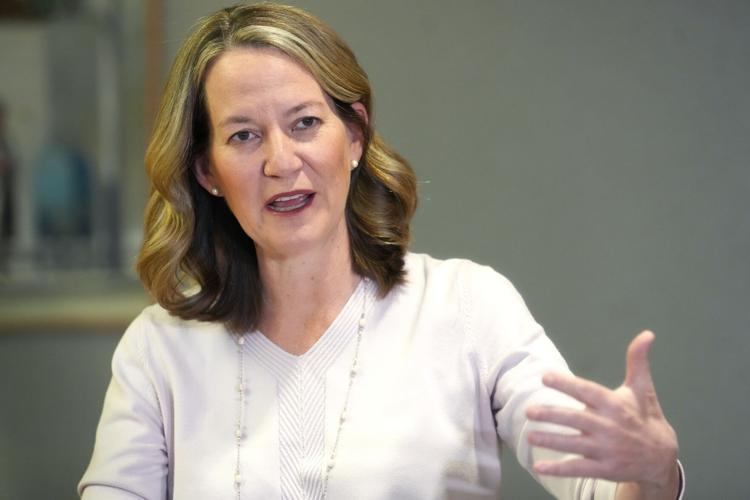Arizona Attorney General Kris Mayes is investigating whether to try to block the proposed merger of the state’s two largest grocery chains.
Mayes said Thursday she wants to know the expected effects of allowing the combination of Kroger Co., the parent of Smith’s and Fry’s Foods, with Albertsons Companies, which operates stores under its own name as well as Safeway stores after buying the company in 2015.
Most important is whether the combination will drive up prices for consumers already suffering under high inflation, Mayes said.
“The impacts of this merger, in particular at a time when people are struggling to pay for groceries and prices are high, could be huge,’’ she said.
There’s also the question of whether the merged company will close stores, forcing some people to travel farther. Mayes also wants to know how all of this would affect the 35,000 workers now employed by both firms.
Mayes is not the only one looking at the $24.6 billion deal announced last year in which Kroger would purchase its competitor.
The Federal Trade Commission is doing its own inquiry and a group of consumers has filed suit in California to block the deal.
Mayes is focused more on what the combination of the two giants will mean here. In fact, on a per capita basis, the merger will have a greater effect on Arizonans than any other state, she told Capitol Media Services.
What she’s able to do about it remains to be seen, however.
State law forbids any “contract, combination or conspiracy by two or more persons in restraint of, or to monopolize trade or commerce.’’
Mayes said she needs to study whether, at least in Arizona, the merger meets that definition.
Her office will also conduct “listening sessions’’ hear what Arizonans think of the deal and how it will affect them.
“The people of Arizona have important input to make here, people who live in the neighborhoods where a Fry’s or a Safeway or a Smith’s could be shut down,’’ said Mayes, a Democrat elected to the office in November. Questions include whether the combined operation, no longer competing for customers with each other, would be free to raise prices, and whether it would shutter some stores.
But she said it isn’t just the people shopping there who might be affected.
“We’re going to be getting input from the dairy operators in Arizona and the farmers and cattle growers who are worried about the reduction in competition in Arizona and the reduction in the number of outlets for their products,’’ Mayes said.
The attorney general said she also wants to look at how many workers at the two companies will end up unemployed if the deal goes through.
A spokesman for Albertsons said there would be no comment.
Kroger, in a statement, said the merger “provides meaningful, measurable benefit to all stakeholders, including lowering prices, providing more choices and establishing a more competitive alternative to large, non-union retailers.’’ That last comment is in reference to Walmart, though not all Kroger stores are unionized, either.
On a website set up by the two chains, Kroger CEO Rodney McMullen said the deal will “deliver superior value to customers, associates, communities and shareholders.’’
It also claims that after the deal is closed, Kroger will invest $500 million to lower prices, $1.3 billion into Albertsons stores “to enhance the customer experience,’’ and $1 billion “to continue raising associate wages and comprehensive benefits.’’
Mayes wants details.
“We’re talking about neighborhoods that could experience the closure of a grocery store, entire communities that might have to drive 100 miles or more to get to a grocery store, and potentially the layoff of thousands of people,’’ she said.
That could affect any decision on whether there would be violations of Arizona’s antitrust laws.
In their announcement, the retailers said they are willing to divest up to 650 of the stores to overcome regulatory concerns. None of the possible locations have been announced.
But even if that happens, there is no guarantee the stores will stay open.
When Albertsons bought Safeway, it agreed to sell 146 stores to Haggen, a regional grocer. But Haggen eventually went bankrupt and Albertson’s bought back many of the stores.
Then there’s the question of whether anyone would be willing to buy the stores the new company is willing to shed, considering it is likely to offer up those that are least profitable.
There is, however, a backup plan: If a buyer can’t be found for the stores the new company is willing to sell, there is an offer to create a spin-off, still owned by Albertsons shareholders, that would operate independently and compete with the newly merged operation.
The merger, and questions about whether it violates state antitrust laws, aren’t occurring in a vacuum. What also needs to be considered is how much competition would remain in Arizona.
Bashas’ operates 118 stores, mostly in Arizona, under that name as well as under Food City and AJ’s Fine Foods.
Walmart generally has more aggressive pricing than either Kroger or Safeway, though it does not put items on sale.
“We will obviously take into consideration the presence of Walmart and Target Super Stores (which carry groceries) in some communities,’’ Mayes said.
“But they’re not everywhere,’’ she said. “That’s one of the things we need to understand in the listening sessions.’’
Mayes said these will be conducted in the next few months. Her office probably needs to make a decision on what action to take, if any, within six months. she said. That should still be enough time to intercede given that the two companies are looking to finalize the deal sometime in 2024.
Rey Rocha, a store manager at Fry's Food Store on East Grant Road, received a $1 million check from the Kroger Community Immunity Giveaway on Aug. 16.





